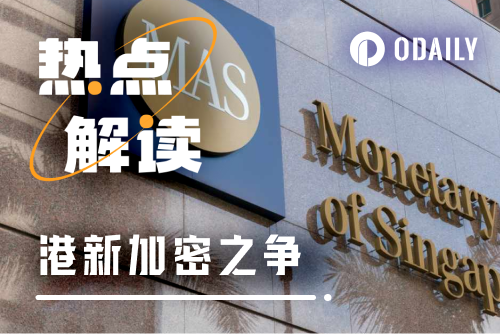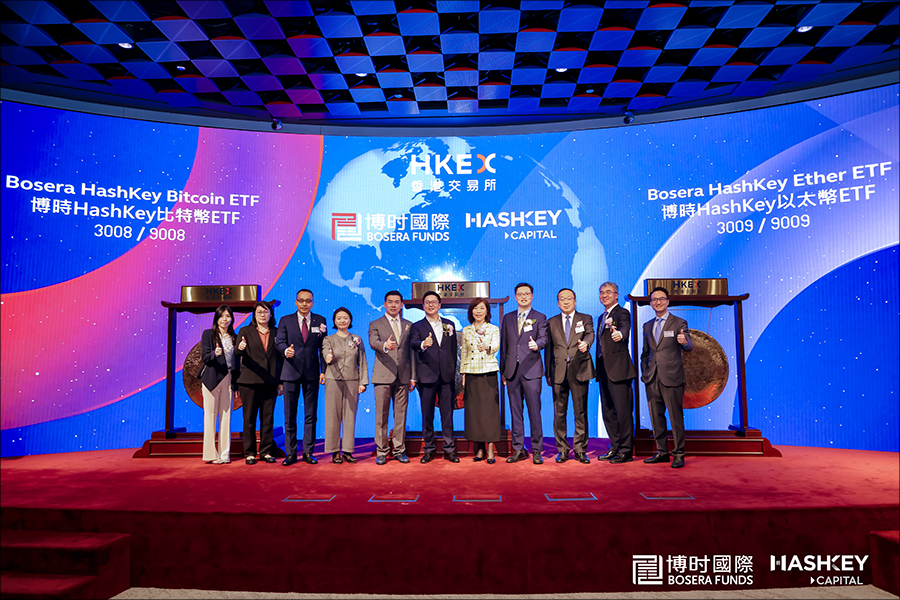Original | Odaily Planet Daily ( @OdailyChina )
Author | Ethan ( @ethanzhang_web3 )

Recently, an undercurrent surrounding the ownership of the "Asian Crypto Center" has surged again.
On May 30, the Monetary Authority of Singapore (MAS) suddenly introduced new Web3 regulations with a "zero tolerance" attitude ( an important focus in the new regulations, previously Odaily Planet Daily has published a compilation of "All unregistered crypto companies must withdraw from Singapore before the end of the month! No transition period!" ), shaking the entire Southeast Asian crypto ecosystem.
On June 4, Hong Kong Legislative Council member Wu Jiezhuang said on the X platform : "We welcome companies engaged in Web3 in Singapore to relocate to Hong Kong. We are willing to provide policies and implementation assistance." This sentence is both an open invitation to the industry and a "relay" in the reshaping of the Web3 landscape.
Web3 has never been a game exclusive to a single region, but a new battlefield for the coordinated competition of global finance and technology. Singapore reconstructs its borders and clarifies its jurisdiction in a strong regulatory environment, while Hong Kong accelerates its exploration in a cautious opening-up. So where will be the safe haven for capital and innovation in the storm?
A heavy blow to Web3: Singapore's tightening regulation causes industry shock
On May 30, the Monetary Authority of Singapore (MAS) issued new DTSP regulations ( original text ), requiring all institutions and individuals engaged in crypto token-related businesses to obtain DTSP licenses before June 30, otherwise they must cease operations. This regulation covers trading platforms, wallet service providers, DeFi protocols, NFT markets, and even KOLs who publish crypto research content . The three major regulatory features of MAS are summarized by the industry as: no buffer period ( immediate execution, no transition period); full coverage ( as long as digital asset services are provided, regardless of the place of registration or operating model, they are all included in the supervision); zero tolerance ( violations will face fines or criminal liability).
Particularly controversial is the expansion of the definition of "business premises" - even if one only "works from home" in Singapore and serves overseas users, they are considered to be subject to regulation, leaving many entrepreneurs feeling "inevitable".
However, on June 6, MAS issued a supplementary clarification to adjust the scope of application of the policy in an attempt to alleviate some market misunderstandings and panic (but to no avail, this "clarification" did not actually relax regulatory requirements) :
The regulation focuses on institutions that "only provide digital payment tokens or capital market token services to overseas customers". Such DTSPs will have to be licensed, but MAS has made it clear that "licenses will be issued very rarely" and most such institutions will face withdrawal;
Projects that provide governance or utility token services (such as DAO platforms, GameFi props tokens, etc.) are not included in this regulatory framework and do not need to be licensed;
Institutions that already serve clients in Singapore will continue to maintain the existing regulatory framework and will not be affected by the new regulations, and can continue to conduct domestic and overseas business;
There is still no transition period , and MAS stressed that it has publicly warned of this policy direction many times since 2022, and only a "very small number" of institutions have been formally identified as affected.
This clarification shows that MAS intends to precisely strike "foreign service providers" with potential cross-border money laundering risks, rather than completely banning the Web3 industry . But at the same time, it also sends a clear signal - after a series of reputation shocks such as the Three Arrows Capital, Hodlnaut explosion, and FTX incident, Singapore's financial regulatory style is shifting from "open experimentation" to "risk prevention first". This trend may end its loose imagination of "Asian Crypto Paradise", and also put many start-up projects into the dilemma of "either high compliance or migration and escape", and also indicates that Singapore's Web3 ecosystem is entering a period of compliance reshaping: resources, structure, cost and risk models will all be redefined.
Embracing Web3: Hong Kong’s open regulation and policy advantages emerge
In stark contrast to Singapore's tightening regulations, Hong Kong is accelerating its embrace of Web3 through a more flexible compliance system.
Since the release of the "Policy Declaration on the Development of Virtual Assets" in 2022, Hong Kong has gradually implemented core systems including the VATP virtual asset trading platform license, stablecoin regulatory regulations, and OTC over-the-counter trading compliance, providing clear expectations for the market.
According to data from the Hong Kong Securities and Futures Commission, as of now, 10 virtual asset trading platforms including OSL Digital Securities Limited, EXIO Limited, and Hash Blockchain Limited have obtained licenses and explicitly allow retail investors to participate in transactions.
In addition, Hong Kong is no longer just "talking on paper" in promoting product innovation in multiple sub-sectors, such as RWA (real world asset) tokenization, virtual asset pledge, and derivatives pilots:
In April this year, the world's first tokenized money market ETF (the Hong Kong dollar and US dollar money market ETF tokenization solution jointly developed by Bosera International and HashKey Group) was approved by the Securities and Futures Commission and landed in Hong Kong, which is also the largest virtual asset ETF market in the Asia-Pacific region;

Bosera HashKey ETFs listing ceremony held at the Hong Kong Stock Exchange
On May 30, the Hong Kong Special Administrative Region Government published the Stablecoin Ordinance in the Gazette , which means that the ordinance has officially become law, setting a regulatory framework for the issuance and use of stablecoins.
In terms of attracting capital and supporting entrepreneurship, Hong Kong is also increasing its resource investment: for example, in terms of enterprise introduction , since the issuance of the Virtual Asset Declaration in 2022, the industry has been welcomed to develop in Hong Kong. According to informal statistics, thousands of Web3 companies have settled in Hong Kong, especially Hong Kong Cyberport, which has gathered nearly 300 Web3 companies, with a total financing of more than HK$400 million; secondly, in terms of taxation , tax incentives are provided for qualified virtual asset transactions (but not yet detailed); in terms of talent introduction , a talent landing subsidy of up to HK$32,000 per month and research researcher funding are provided; in terms of policy , the government takes the initiative to "attract investment and talent", and attracts restricted companies in Singapore to relocate their headquarters, etc.
Compared with Singapore’s increasingly stringent environment, Hong Kong appears to be particularly “friendly” at this time and is more suitable for entrepreneurs to conduct market exploration and experimental innovation.
Dream and reality: Is Hong Kong a “new center” or a “transition station”?
However, when we try to draw the conclusion that “Hong Kong is more welcoming to crypto entrepreneurs than Singapore”, we still need to remain calm about reality.
From a factual perspective, Hong Kong has indeed shown its willingness to take on more roles, but the industry is also aware that it still faces many problems and challenges: for example, although the policy statements are clear, the progress of implementation is still uneven; in addition, the infrastructure and supporting services are still imperfect, and start-ups face considerable resistance in the early stages; and although the tax policy has advantages, the details of the supervision still need to be further clarified.
From the perspective of entrepreneurs, "moving to Hong Kong" is not a decision that was made on the spur of the moment, but rather a "second-best option when there is no better option." Some even believe that instead of building a new base in Hong Kong, it is better to move directly to crypto-friendly regions such as Dubai, where policies are relaxed and environmental costs are low. It is also worth observing the crypto initiatives of the new South Korean president after he takes office.
In other words, Hong Kong today is more like a "relay station" after Singapore's withdrawal, rather than a new hub that immediately has a complete ecological closed loop.
Conclusion: The dispute between Hong Kong and Singapore is just a microcosm of the Asian Web3 ecosystem
Regulatory fluctuations, policy differences, and ecological evolution are all external manifestations of the game between capital and innovation forces in the Web3 era.
This time, Singapore chose to "set rules" while Hong Kong chose to "direct traffic". In the long run, this is not a black-and-white contest, but a reshaping of the division of labor in the ecological positioning: Singapore may evolve into a compliant asset management center, while Hong Kong will assume the role of a technology testing ground and Asian capital hub.
For entrepreneurs, the most important thing is never which city to bet on, but to always maintain accurate perception and rapid response capabilities of policy direction, regulatory scale and market space. The world of Web3 is always fluid, and the real "safe haven" may not only be on the map, but also in the hearts of every team that makes sober decisions.